- Home
- Elmore Leonard
The Law at Randado Page 13
The Law at Randado Read online
Page 13
He told them everything then, beginning with their arrival at La Noria. He told it quietly and most of the time he looked at Mrs. Tindal.
“Sundeen forced your husband to go with him, Mrs. Tindal. We know that for a fact.”
Milmary said, “Be sure you’re not blamed for anything.”
“De Spain will testify that Sundeen forced them to leave his place at gun point.”
“That’s noble of Mr. De Spain.”
“Mil, why don’t you talk like you’ve got some sense?”
She held his gaze silently for a moment. “Are you finished now?”
“I guess I am.” He started to put on his hat.
“Kirby.”
He looked at Mrs. Tindal. She had not spoken before and now the sound of her voice surprised him.
“Did you see him, Kirby?”
“No ma’am, I didn’t.”
“What will happen to him?”
“Nothing, Mrs. Tindal. This is kind of a game with Phil Sundeen. Soon he’ll get tired of it and come home.”
“He won’t do anything to them?”
“No ma’am, I’m sure he won’t.”
Milmary said, “But when he comes back—”
Frye nodded once. “He’ll stand trial.”
“Will you take him to Yuma, too?”
He ignored Milmary’s question. “Mrs. Tindal, you can figure your husband won’t get more than a fine, if that. Judge Finnerty’s a friend of Mr. Tindal’s.” Frye smiled. “You know he wouldn’t send him to Yuma.”
Milmary asked abruptly, “But what happened to Mr. Beaudry?”
“He was shot in the leg trying to run.”
“How do you go about dodging that blame?”
“Mil, he fired on us first.”
“Did you shoot him, Kirby?”
“No.”
“That was decent of you, since he helped get you your job.”
He looked at Mrs. Tindal instead of answering. “Can I do anything for you, ma’am?”
“Haven’t you done enough?” Milmary asked.
He thought: You asked for it. But she could have thought of something better than that to say. He felt his temper rise, hearing her words again in his mind. He moved to the door putting on his hat, then touched the brim to them and stepped outside.
Maybe this is a good thing, he thought as he walked toward De Spain’s. You get to know a person better when something like this comes up. After you’re married, how’d you like to have that the rest of your life, everytime you have a disagreement? She’d give you that silent act. If you said something she had to answer, then she’d come back with the ice-water tone. I think I’d rather have a woman who throws plates. She’d get it out of her system and it would be over with. Well, enough’s enough. If she wants me, she knows where to come.
He told these things to himself but he did not completely believe them. They made him feel better, that was all.
He nodded to a group of men standing in front of De Spain’s, then started across the street toward the jail. His back was to them when he heard one of them say, “Some people think they’re pretty goddamn big.”
Frye stopped and half turned. One of the men was holding on to a support post staring at him defiantly. He was drunk and without the post would have fallen into the street. Behind him, four men stood close as if in conversation. They paid no attention to the drunk, though before, when Frye nodded, the five of them had been standing together.
He continued across the street and entered the jail office. Harold Mendez came away from the window as he closed the door.
“Harold.” He nodded to the jailer. “I see you fixed the windows.”
“Digo did,” Harold said, “he broke them. I tied his feet and held a shotgun behind his back while he did it.”
Frye took off his hat and slumped wearily into the chair in front of the desk. He leaned forward to unfasten his spurs, then going back, lifted his feet to the desk and crossed them.
“I saw you come in with Beaudry,” Harold said. “One of Danaher’s men left his gear here. When he came in for it, he told me the whole thing.”
Frye was silent. Then he said, “How are they talking about it at De Spain’s?”
“I haven’t been over there.”
“Did you see that just before I came in?”
Harold nodded. “What did he say?”
“Some people think they’re pretty goddamn big.”
“He was drunk,” Harold said. “When he’s not cleaning the livery he’s drunk. You never know what he’ll say.”
“He didn’t say it. The four behind him did. They poured the words in and he used them.”
“You have to expect a certain amount of that.”
“What are they saying, Harold?”
“Well…last night a few men came over from De Spain’s and one of them asked if the rest of the people could consider themselves safe or should they run too. It was supposed to be cutting, but he sounded as if he was reading it. He said when the manager of the bank and the town’s leading merchant have to leave town, then it’s time to look more closely at the one who’s chasing them, and reconsider. Something like that.”
“Did you mention,” Frye said, “Sundeen’s Colt making them run?”
“They’re going back before that,” Harold said. “Many of them took part in the hanging even if they didn’t tie the knots. They’re not wanted, but they probably still feel obliged to share a little of the blame with Tindal and Stedman. The way to do that is oppose you.”
“How do they feel about Sundeen?”
“He’s the biggest man around here. They’re awed by him, even if they don’t like him, and they don’t see how a young deputy who’s only been here a month gets off chasing him out of town. People are scared to death of Phil Sundeen, but they still look up to him. Because he’s got money if for no other reason. A man with money must be important.”
“Which is how the whole thing started,” Frye said.
“That’s right.”
Frye shook his head. “There must be some sensible people here.”
“Plenty,” Harold answered. “They’re the ones that hardly even talk about it. They probably think we’re all children.”
Frye was silent, but after a moment he said, “Harold, I’m tired.”
The jailer nodded. “I know what you mean.”
When Danaher came in Frye was shaving in front of a mirror propped on the desk. He was sitting on the edge of the chair and turned to look at Danaher as he entered.
“How was yours?” Danaher asked.
“Well, I didn’t get the red carpet.”
“Maybe you should have done that first.” Danaher nodded to the razor.
“I needed more than a clean face.”
“Ten years from now you and Mil will think back on this and you might even smile.”
“How did you do?”
“The ladies were obliged to greet me with cold stony eyes and expressions that would’ve cracked like china had you touched them.”
“How’d you expect them to treat you?”
“Kirby, I never expect anything.”
“Yes sir,” Frye said, not knowing, or caring, how Danaher would take it.
“You need sleep,” Danaher said.
He wanted to say it again, because he was suddenly near the end of his patience. Yes sir—something a kid would say in a tone all of its own, thinking he was smart. He realized this, and held on; and moving the razor down his jaw line slowly, he said, “John you want to get something to eat first?”
They went to the Metropolitan and throughout the meal they spoke little. Once, Danaher said, “You feel all alone now, don’t you?” and this stayed on Frye’s mind even after they left the café. Maybe Danaher could read his thoughts—like when he was hiring him for the job after the Galluro thing. At the boardinghouse they bathed and went to bed, but before falling asleep Frye thought: He was talking from experience. Danaher feels alone too. And that was
some consolation. Enough to let him fall asleep almost right away.
In the evening they ate at the Metropolitan again. Haig Hanasian served them and at the end of the meal he leaned close to Frye and said, “If you go out again, I would look upon it as a privilege to be along.”
“We’re not sure we will.”
“Just if you do.”
They returned to the jail office to smoke and theorize now. They would wait for Sundeen’s move, but they could be thinking while they waited. Harold brought a bottle and glasses and in the semi-darkness they sipped whisky and talked until late.
Probably Sundeen had taken them across the border. That was logical; that made more sense than anything else. Still, Sundeen was not a man who lived by his reason. Frye remembered Danaher’s words earlier in the day, “I never expect anything.” That was the way to consider Sundeen. Don’t say, “He probably did this.” You’ll find out he did the opposite.
So they didn’t take for granted that Sundeen crossed the border. And the more they thought about it, the stronger the possibility was that he had not.
“He could even swing back this way,” Danaher said, “to see what happened to Digo. He could even have in mind raising a fighting force. He’s bullheaded enough.”
“What about Tindal and Stedman talking him into giving up?” Frye suggested.
“Not a chance.”
“They could circle up to Tucson and turn themselves over to Judge Finnerty.”
“I don’t think so.”
“Digo talked him into running when he was set against it.”
Danaher nodded thoughtfully. “That’s right.”
“Maybe he’s not the stone wall we give him credit for,” Frye said.
“But you can’t predict the bastard. That’s the trouble.”
They were in the office again the next morning, Danaher having decided to return to Tucson since there was nothing to do but wait, and he was getting ready to go when Ford Goss rode in. Ford looked drained; as if he’d been riding all night.
He swung off, seeing them standing in the doorway, and the first thing he said was, “Dandy caught their sign!”
12
They rode southeast from Randado, Ford Goss showing the way, his saddle on a fresh mount and Ford in it again after a rest that lasted only as long as it took to drink a cup of coffee and eat a plate of meat and beans. He was bone tired, but he stayed in the saddle and followed his own trail without any trouble, without even thinking about it, because this was not something new. He couldn’t count the number of watches he’d stood over a night herd, then stayed in the saddle the whole next day until sundown. It was part of a riding job.
At their first rest, Ford related the details of finding Sundeen’s trail. How they had ridden south from La Noria and swung east along the border for half a day without seeing a track of any kind. Merl said maybe they crossed during the rain; but maybe they didn’t go over the border after all, and that was worth checking. So they started bearing north in a wide circle. West was open country, but northeast from La Noria were the Huachucas and that way made more sense. By midafternoon they had picked up four tracks bearing more to the east, Dandy Jim spotting the hoof marks no white man could have. They followed. At a waterhole farther on they found two cigarette stubs and there the tracks of four horses were unmistakable. Then luck hit them right in the face. “Good luck that only comes from living right,” Ford said. An hour from the waterhole they came across two Tonto-Mojave women dressing down a buck. The women told Dandy Jim they had watched from a distance as a party of white men shot the buck and took its hindquarters. Now they were only taking what had been left. Dandy asked them what the men looked like. They described each man—and then there was no longer any doubt. That evening when they camped, they matched to see who was going to ride all night to Randado. Ford lost.
Danaher was along with his six men—Danaher riding easily for a big man, unconcernedly, a cigar clamped in the corner of his mouth.
Frye and Haig Hanasian rode side by side most of the time. Frye slouched in the saddle, his straight hatbrim low over his eyes. He could have been asleep, the loose way he followed the dun gelding’s motion; but he was not asleep and he missed nothing.
Haig Hanasian rode in silence. He made no comment about the weather, nor about the trail becoming rougher as they climbed into the foothills of the Huachuca range. Haig’s hat was narrow-brimmed and he wore a full suit and a cravat. Everything about him seemed out of place except the expression on his face. Frye noticed this. Haig’s silence and his masked expression told nothing; yet by their presence they told everything. At least to Frye. He remembered Edith mistaking him for Sundeen the night he entered the café late, as if she had been expecting Phil. Probably something was going on between them, Frye thought. Haig found out. And now he wants to do something about it.
Before noon they reached the camp where Ford had left Merl. Riding at night it had taken Ford seven hours to reach Randado; returning during daylight they did it in almost half that time.
“Merl and Joe and Dandy stayed the night here,” Ford explained.
“You must have been close to them,” Frye said. It was a dry camp and there had been no fire.
“So close we had to stop when we did,” Ford said, “for fear of riding on them in the dusk. Merl said him and the boys would go on at daylight, but that we’d be able to follow him easy.”
They rested the horses, then moved on following Merl’s sign, crossing a three-mile length of meadow where the wild grass was broken and bent forward in a narrow path down the middle. Through scattered pine stands they followed branches Merl had broken and left hanging. Over rocky ground there were stones set in a row pointing the way. They could have followed the horse tracks, but this saved time and time was the important element. They entered a draw that was narrow and overgrown with brush and they moved through it single file, feeling the gradual rise and when it opened they were high up on a bench that looked down on a valley and the tops of jackpines far below. Dandy Jim was there waiting for them.
He led them along the bench, then down a slope through dim, silent timber. At the bottom, watering their horses in a stream, Merl White and Joe Tobin were waiting.
Merl was squatting on his heels at the edge of the stream. He looked over his shoulder, then rose as Dandy Jim brought them in.
“Where you been?”
Danaher stepped out of the saddle. “The other side of the mountain pickin’ our noses.”
Frye’s gaze moved over the small clearing. He saw traces of the fire that had been smothered out, and close to him, at the edge of the clearing, the grass was trampled and broken off where the horses had been picketed. He watched Dandy Jim cross to the stream removing his red cotton headband. He dipped it in and out of the water quickly, then spread it out and rubbed mud into it from the damp bank. He shook it, then spread it out again to let the sun dry the mud. They’re close, Frye thought.
He heard Merl White saying, “We got us a problem. They split up here.”
“What?” Danaher was lighting a cigar but he held it and the match went out in his hand.
Frye swung down and let his horse go to the stream. “Maybe they split up leaving here,” Frye said, “but met again further on.”
Merl shook his head. “Three of them went due north up the stream, but one crossed over and followed it down the other way.”
Danaher lit his cigar and blew on it slowly. “Now which one would that be?”
“You wouldn’t think Tindal or Stedman,” Frye said.
“Unless,” Danaher said, “one of them got a chance to sneak off during the night.”
Frye asked Merl, “Where’d he cross?”
“Right there where your horse’s watering.”
“They were grazed over on the other side,” Frye said. “That means he’d have to have brought his horse right through camp to cross the stream there.”
“I didn’t finish,” Merl said. “We figure whoever it was, l
eft a few minutes before the others, and in daylight. Dandy crossed over and followed his sign a ways, down the stream about a hundred yards, then up into the trees. Dandy says up there in a clearing the man had stopped. You can see this camp from there. The man waited there a while, least long enough to smoke a cigarette, because the stub of it was there. And he must have been watching the others.”
“The careful type,” Danaher said.
Frye said, “And he smokes cigarettes. You ever see Tindal or Stedman with anything but a cigar?”
“No,” Danaher answered, “I don’t believe I have.”
“Are you thinking,” Frye asked, “what I’m thinking?”
“Probably so,” Danaher said. “Sundeen wouldn’t be likely to walk out on his old committee friends after going to so much trouble to bring them along. And he doesn’t strike you as the kind who’d sit over there and smoke a cigarette once he’d made up his mind to move. That leaves one man. Jordan. If they had an argument and Jordan walked out, I think he’d be inclined to watch them till they were out of sight.”
Frye looked at Merl. “How far did Dandy follow him?”
“About an hour.”
Frye went over to Dandy Jim and the Coyotero, squatting down, looked up at him and grinned as if to say: I’ve been waiting for you.
Danaher watched them and it reminded him of Galluro to see the two squatting together drawing lines on the smoothed dirt. He drank a cup of cold coffee from Merl’s canteen, then saw them stand up.
The Coyotero took the cloth that was spread open next to him, folded it into a triangle and tied it over his long hair, knotting it in back. He looked like a color picture Danaher had once seen of a pirate, only now the headband wasn’t red; it was a dull brown color that wouldn’t be seen through the trees or stand out against rock. Then Frye came toward him.
“John, Dandy and I figure we can take Jordan before he gets anywhere near the border.”
“Is that so?”

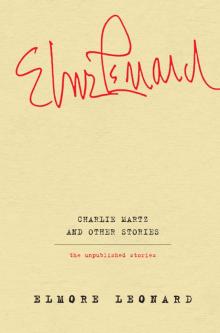 Charlie Martz and Other Stories: The Unpublished Stories
Charlie Martz and Other Stories: The Unpublished Stories Elmore Leonard's Western Roundup #2
Elmore Leonard's Western Roundup #2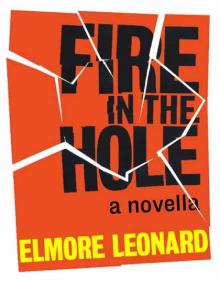 Fire in the Hole
Fire in the Hole Tishomingo Blues (2002)
Tishomingo Blues (2002)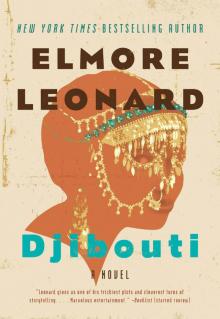 Djibouti
Djibouti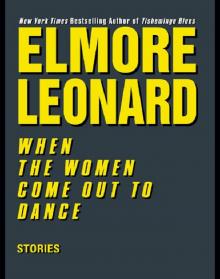 When the Women Come Out to Dance: Stories
When the Women Come Out to Dance: Stories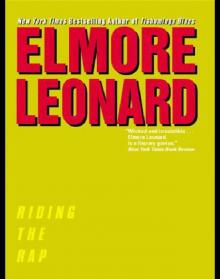 Riding the Rap
Riding the Rap Moment of Vengeance and Other Stories
Moment of Vengeance and Other Stories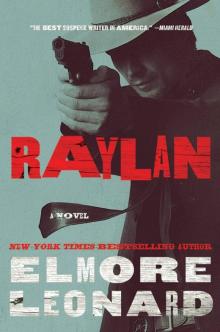 Raylan
Raylan Touch
Touch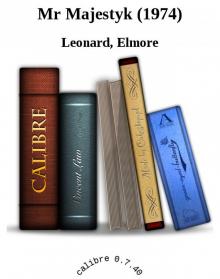 Mr Majestyk
Mr Majestyk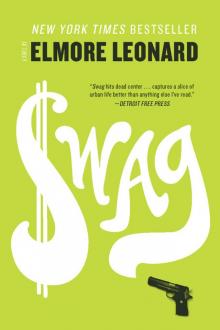 Swag
Swag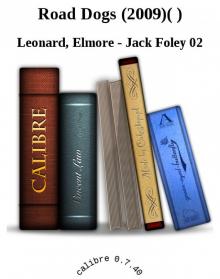 Road Dogs
Road Dogs La Brava
La Brava The Hot Kid
The Hot Kid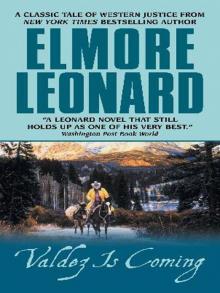 Valdez Is Coming: A Novel
Valdez Is Coming: A Novel Be Cool
Be Cool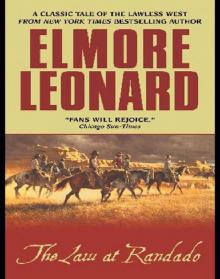 The Law at Randado
The Law at Randado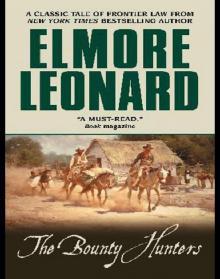 The Bounty Hunters
The Bounty Hunters When the Women Come Out to Dance
When the Women Come Out to Dance 310 to Yuma and Other Stories (1953)
310 to Yuma and Other Stories (1953)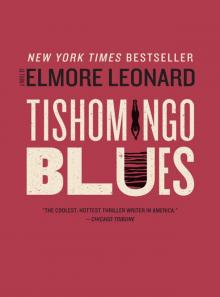 Tishomingo Blues
Tishomingo Blues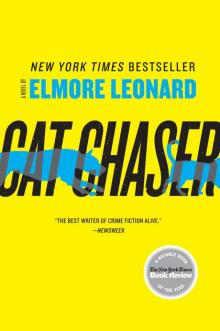 Cat Chaser
Cat Chaser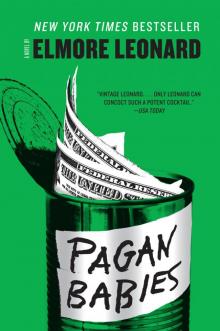 Pagan Babies
Pagan Babies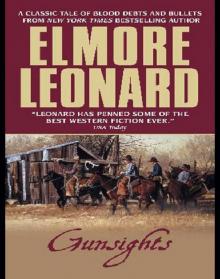 Elmore Leonard's Western Roundup #1
Elmore Leonard's Western Roundup #1 52 Pickup
52 Pickup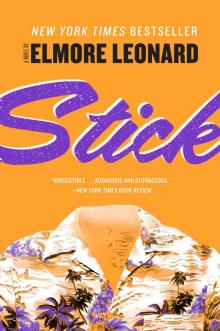 Stick
Stick The Moonshine War
The Moonshine War Valdez Is Coming
Valdez Is Coming City Primeval
City Primeval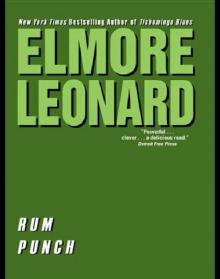 Rum Punch
Rum Punch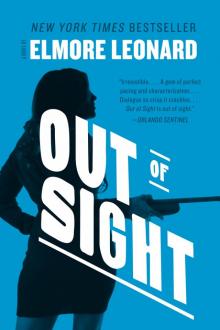 Out of Sight
Out of Sight Naked Came the Manatee (1996)
Naked Came the Manatee (1996)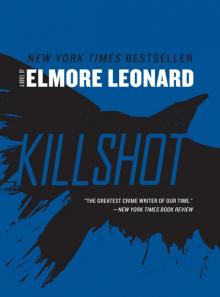 Killshot
Killshot Cuba Libre
Cuba Libre Forty Lashes Less One
Forty Lashes Less One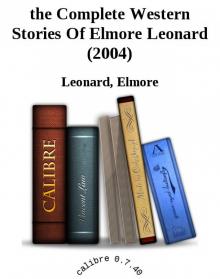 The Complete Western Stories of Elmore Leonard
The Complete Western Stories of Elmore Leonard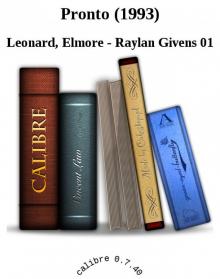 Pronto
Pronto Split Images
Split Images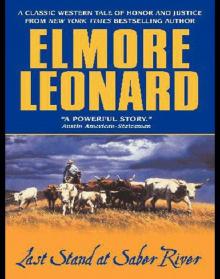 Last Stand at Saber River
Last Stand at Saber River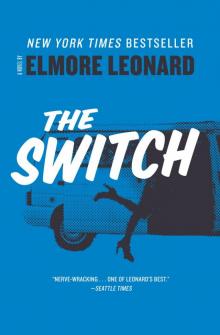 The Switch
The Switch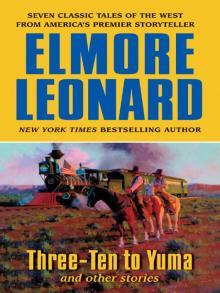 Three-Ten to Yuma and Other Stories
Three-Ten to Yuma and Other Stories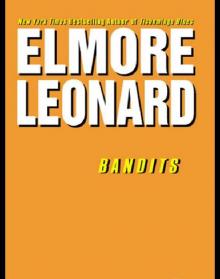 Bandits
Bandits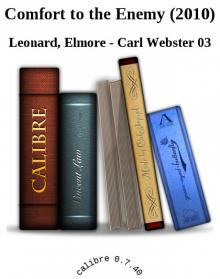 Comfort to the Enemy and Other Carl Webster Stories
Comfort to the Enemy and Other Carl Webster Stories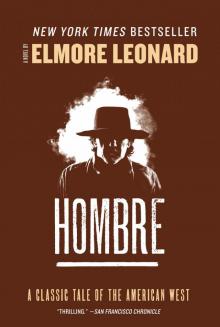 Hombre
Hombre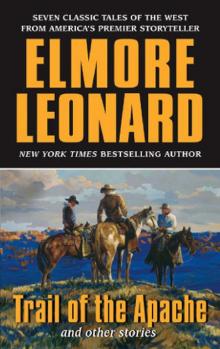 Trail of the Apache and Other Stories
Trail of the Apache and Other Stories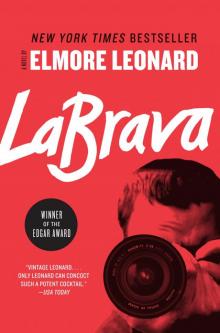 LaBrava
LaBrava Gold Coast
Gold Coast Jackie Brown
Jackie Brown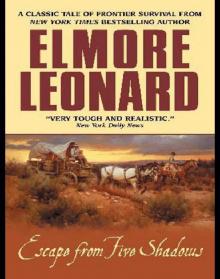 Escape From Five Shadows
Escape From Five Shadows Karen Makes out (1996)
Karen Makes out (1996)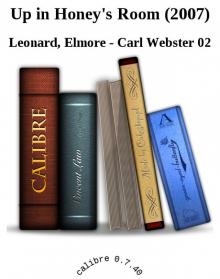 Up in Honey's Room
Up in Honey's Room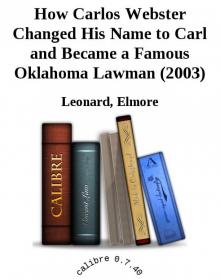 How Carlos Webster Changed His Name to Carl and Became a Famous Oklahoma Lawman (2003)
How Carlos Webster Changed His Name to Carl and Became a Famous Oklahoma Lawman (2003)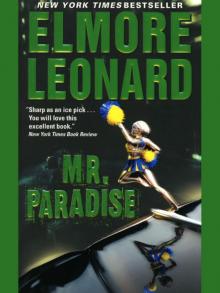 Mr. Paradise
Mr. Paradise The Hunted
The Hunted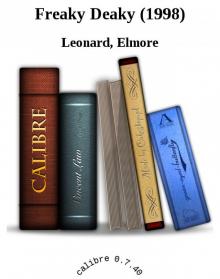 Freaky Deaky
Freaky Deaky Louly and Pretty Boy (Ss)
Louly and Pretty Boy (Ss)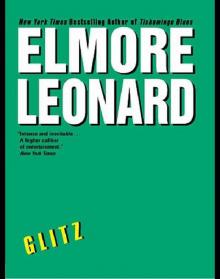 Glitz
Glitz A Coyote's in the House
A Coyote's in the House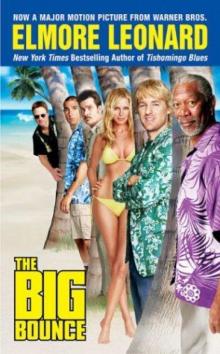 The Big Bounce jr-1
The Big Bounce jr-1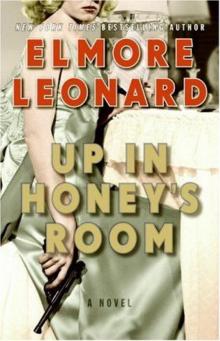 Up in Honey's Room cw-2
Up in Honey's Room cw-2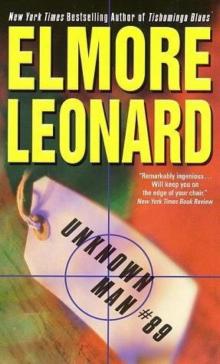 Unknown Man #89 jr-3
Unknown Man #89 jr-3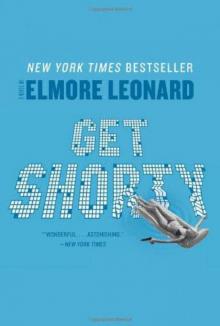 Get Shorty: A Novel cp-1
Get Shorty: A Novel cp-1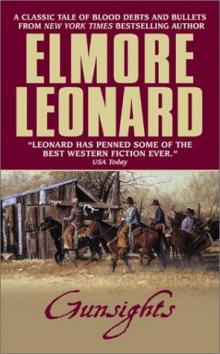 Gunsights
Gunsights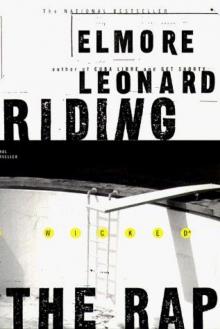 Riding the Rap rg-2
Riding the Rap rg-2